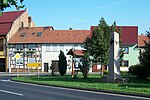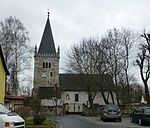Mühlhausen (German: [ˈmyːlhaʊzn̩]) is a town in the north-west of Thuringia, Germany, 5 km (3 miles) north of Niederdorla, the country's geographical centre, 50 km (31 miles) north-west of Erfurt, 65 km (40 miles) east of Kassel and 50 km (31 miles) south-east of Göttingen.
Mühlhausen was first mentioned in 967 and became one of the most important cities in central Germany in the late Middle Ages. In the mid-13th century, it became a Freie Reichsstadt, an independent and republican self-ruled member of the Holy Roman Empire, controlling an area of approximately 220 square kilometres (85 sq mi) and 19 regional villages. Due to its long-distance trade, Mühlhausen was prosperous and influential with a population of 10,000 around 1500. Because it was spared from later destruction, Mühlhausen today has a great variety of historical buildings with one of the largest medieval city centres remaining in Germany, covering a surface of more than 50 hectares within the inner city wall and approximately 200 hectares overall. There are eleven Gothic churches, several patricians’ houses and a nearly completely preserved fortification.
Johann Sebastian Bach worked as the city's organist in 1707–08. The theologian Thomas Müntzer, a leading person in the German Peasants' War, gave sermons here and was executed outside the city walls. John A. Roebling, the constructor of the Brooklyn Bridge, and Friedrich August Stüler, an influential architect in mid-19th-century Prussia, were born in Mühlhausen.
Mühlhausen is within the Thuringian Basin, a flat and fertile area, on the Unstrut river on the eastern edge of the Hainich hills.











